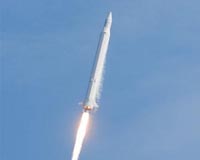 |
Seoul (AFP) June 11, 2010 South Korean and Russian experts launched an investigation Friday after the fiery failure of the Asian country's latest rocket launch, which some researchers blamed on inadequate testing. The Naro-1 rocket, which was Russian-made but assembled in South Korea, veered off course and exploded 137 seconds after blast-off on Thursday. The mishap came after a first rocket failure last year, thwarting South Korea's plans to launch a scientific satellite and setting back its dreams of joining Asia's space race. The Korea Aerospace Research Institute (KARI) said the debris fell into the sea, some 470 kilometres (295 miles) south of the Naro Space Centre's launch pad off the southern coast. KARI on Friday convened a meeting of a joint investigation committee of the two countries to determine the cause of the failure, a spokesman for the Education, Science and Technology Ministry said. "It went wrong after the first-stage rocket completed two-thirds of its work," KARI research fellow Chae Yeon-Seok told AFP. Researchers said this was verified by video from a camera mounted on the rocket as well as live TV footage, which both showed a sudden brightening and orange flames of an explosion. South Korea was trying to join an exclusive club currently numbering nine nations that have put a satellite into orbit using a domestically assembled rocket. Its first attempt failed last August when fairings on the nose cone of the Naro-1 did not open properly to release the satellite. "It is very regretful that we were unable to verify whether the faulty aspects that caused last year's failure were properly addressed this time, as we lost the rocket too early in flight," Chae said. He and other South Korean researchers noted that the Russian rocket was a new vehicle that was still under development and whose performance was not fully tested through flights. "When we launched the rocket in the first attempt last year, that was the only flight test before this launch. We have not had many chances to verify its credibility," Chae said. Professor Shim Hyun-Chul of the Korea Advanced Institute for Science and Technology said Russia should take responsibility. "There have been concerns over the reliability of the rocket as it has not been tested enough," he told Yonhap news agency. The government put a brave face on the second failure. "Though we humbly accept the results, we shall not give up on our dream of becoming a space power," Science and Technology Minister Ahn Byong-Man said Thursday. Plans for a third attempt will be announced after the investigation is completed, he said. Under its contract with South Korea, Russia is supposed to provide another rocket in case of a failed launch, officials in Seoul said. South Korea's biggest-selling daily, the Chosun Ilbo, said the country must take heart from the way it rapidly industrialised from modest beginnings. "We have a long road ahead and the Naro-1 launch is only the first step," it said in an editorial. "When we started shipbuilding and the IT industry, we were also behind others." South Korea, despite its status as an international economic powerhouse, entered Asia's space race relatively late. It has previously sent 10 satellites into space using launch vehicles from other countries. In 2007 the country announced a plan to launch a lunar orbiter by 2020 and to send a probe to the Moon five years after that.
Share This Article With Planet Earth
Related Links Rocket Science News at Space-Travel.Com
 S.Korea rocket Naro-I blows up minutes after blast-off
S.Korea rocket Naro-I blows up minutes after blast-offSeoul (AFP) June 10, 2010 A South Korean rocket trying to put a satellite into orbit exploded Thursday less than three minutes after blast-off, dealing another blow to Seoul's dreams of joining Asia's space race. Science and Technology Minister Ahn Byong-Man told reporters the Naro-I rocket was thought to have blown up 137 seconds after blast-off, the same time as ground control lost contact with it. "The Naro ap ... read more |
|
| The content herein, unless otherwise known to be public domain, are Copyright 1995-2010 - SpaceDaily. AFP and UPI Wire Stories are copyright Agence France-Presse and United Press International. ESA Portal Reports are copyright European Space Agency. All NASA sourced material is public domain. Additional copyrights may apply in whole or part to other bona fide parties. Advertising does not imply endorsement,agreement or approval of any opinions, statements or information provided by SpaceDaily on any Web page published or hosted by SpaceDaily. Privacy Statement |